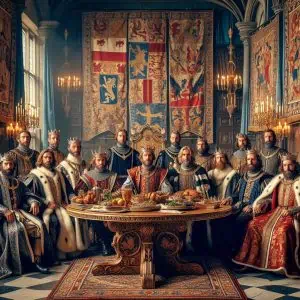King Alfred the Great, one of England’s most celebrated monarchs, is remembered for his exceptional leadership, military prowess, and wisdom. He successfully defended his kingdom against Viking invasions, implemented legal and educational reforms, and laid the foundation for a unified English nation. Beyond his battlefield victories, Alfred’s visionary approach to governance, learning, and justice cemented his reputation as a king whose influence extended far beyond his lifetime. This article delves into the legacy, achievements, and enduring wisdom of King Alfred the Great.
Among these luminaries, King Alfred the Great stands tall as a figure whose reign resonates through the ages.
Regarded by many as the greatest king of England, Alfred’s legacy is a testament to his leadership, wisdom, and enduring impact on his kingdom and beyond.
Early Life and Turbulent Times
Born in 849 AD, King Alfred was the youngest son of King Æthelwulf of Wessex. His formative years were characterized by the tumultuous Viking invasions that plagued England. These early experiences instilled in Alfred a profound understanding of the challenges his kingdom faced, igniting the fire of resilience that would define his reign.

Defender Against Viking Incursions
Alfred’s reign was marked by his unyielding determination to defend his realm from the Viking onslaught. He successfully organized and reformed the English military, creating a network of fortified towns (known as burhs) to repel Viking attacks. His strategic prowess culminated in the resounding victory at the Battle of Edington in 878 AD, which significantly curtailed Viking incursions into England.

Champion of Learning and Culture
Beyond his military acumen, Alfred’s commitment to learning and culture set him apart as a visionary leader. Recognizing the importance of education, he promoted literacy and scholarship, translating key texts into Old English to make knowledge accessible to his people. This endeavor laid the foundation for a flourishing literary and cultural revival that would shape England’s identity.

Legal Reforms and Governance
Alfred’s reign was marked by a profound commitment to justice and governance. He established a code of laws that aimed to provide a fair and consistent legal framework for his subjects. These laws, known as “Domboc” or “Doomsday Book,” reflected his desire to ensure equitable treatment and maintain social order.

Legacy and Influence
Alfred’s influence extended far beyond his lifetime. His dedication to education, codification of laws, and military reforms provided a solid foundation for future generations. His efforts sowed the seeds of a unified English kingdom that would continue to evolve in the centuries that followed. The legacy of Alfred’s reign was so impactful that he earned the moniker “the Great,” a title that aptly captures the breadth of his accomplishments.

Modern Reflections
Alfred’s legacy continues to inspire admiration and respect in modern times. His unwavering commitment to the betterment of his kingdom, his pursuit of knowledge, and his dedication to justice exemplify the qualities of an exceptional leader. He stands as a timeless reminder that leadership is not solely defined by military conquests, but by the enduring positive impact a ruler leaves on their people and their nation.

In the annals of history, King Alfred the Great shines as a beacon of wisdom, resilience, and progress. His legacy transcends the boundaries of time, reminding us that greatness is forged not in ease but in the crucible of challenges.
As England’s beacon of hope during a tumultuous era, King Alfred’s legacy continues to illuminate the path of leadership and inspire generations to come.
📜 Frequently Asked Questions
Why is King Alfred called “the Great”?
He earned the title due to his **military successes, wise governance**, and significant contributions to **law, education, and culture** in England.
What were Alfred’s major military achievements?
He successfully **defended Wessex against Viking invasions**, reorganized the army, and implemented strategic fortifications to protect his kingdom.
How did Alfred contribute to education?
He promoted **literacy, learning, and translation of Latin texts into Old English**, aiming to educate clergy and nobles for better governance.
What legal reforms did Alfred introduce?
He codified laws that combined **traditional Anglo-Saxon customs with Christian principles**, emphasizing justice, fairness, and protection of the weak.
Did Alfred unify England?
While full unification came later, Alfred’s efforts to **strengthen Wessex and promote a sense of shared English identity** laid the groundwork for a united nation.
What is Alfred’s legacy today?
Alfred’s legacy includes **military innovation, educational reform, legal foundation**, and an enduring symbol of **wise and just kingship** in England.
Why is studying Alfred important?
Studying Alfred provides insights into **medieval leadership, governance, and the challenges of defending and reforming a kingdom**, offering lessons still relevant today.
📜 Frequently Asked Questions
Why is King Alfred called “the Great”?
He earned the title due to his **military successes, wise governance**, and significant contributions to **law, education, and culture** in England.
What were Alfred’s major military achievements?
He successfully **defended Wessex against Viking invasions**, reorganized the army, and implemented strategic fortifications to protect his kingdom.
How did Alfred contribute to education?
He promoted **literacy, learning, and translation of Latin texts into Old English**, aiming to educate clergy and nobles for better governance.
What legal reforms did Alfred introduce?
He codified laws that combined **traditional Anglo-Saxon customs with Christian principles**, emphasizing justice, fairness, and protection of the weak.
Did Alfred unify England?
While full unification came later, Alfred’s efforts to **strengthen Wessex and promote a sense of shared English identity** laid the groundwork for a united nation.
What is Alfred’s legacy today?
Alfred’s legacy includes **military innovation, educational reform, legal foundation**, and an enduring symbol of **wise and just kingship** in England.
Why is studying Alfred important?
Studying Alfred provides insights into **medieval leadership, governance, and the challenges of defending and reforming a kingdom**, offering lessons still relevant today.






